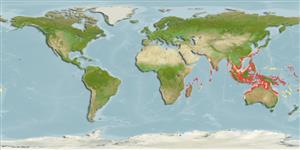Common names from other countries
Teleostei (teleosts) >
Beloniformes (Needle fishes) >
Zenarchopteridae (Internally fertilized halfbeaks)
Etymology: Zenarchopterus: Particle zen, derived from zao = to give life + Greek, archos = anus + Greek, pteron = fin.
More on author: Valenciennes.
Environment: milieu / climate zone / depth range / distribution range
Ecology
Marine; brackish; reef-associated; depth range 0 - ? m. Tropical
Indo-West Pacific: India, Malay Peninsula, East Indies, Philippines, Hainan Island in China, Taiwan, New Guinea and northern Australia (Ref. 10943). Known from the lower Mekong (Ref. 12693).
Length at first maturity / Size / Weight / Age
Maturity: Lm ?, range 10 - ? cm
Max length : 23.0 cm TL male/unsexed; (Ref. 7050)
Dorsal spines (total): 0; Dorsal soft rays (total): 11 - 12; Anal spines: 0; Anal soft rays: 10 - 13. This species is distinguished by the following characters: upper jaw distinctly wider than long; width divided by length 1.05-1.35; sixth anal fin ray of adult males much thickened and enlarged, not reaching base of caudal fin; fourth to seventh dorsal rays of adult males slightly elongate; a prominent dark brown stripe along the midline of the snout.
Found at the surface levels in coastal waters, estuaries and rivers. Feeds on terrestrial insects. Not seen in markets (Ref. 12693).
Life cycle and mating behavior
Maturities | Reproduction | Spawnings | Egg(s) | Fecundities | Larvae
Ovoviviparous.
Collette, B.B. and J. Su, 1986. The halfbeaks (Pisces, Beloniformes, Hemiramphidae) of the Far East. Proc. Acad. Nat. Sci. Philadelphia 138(1):250-301. (Ref. 10943)
IUCN Red List Status (Ref. 130435)
CITES (Ref. 128078)
Not Evaluated
Threat to humans
Harmless
Human uses
Tools
Special reports
Download XML
Internet sources
Estimates based on models
Preferred temperature (Ref.
115969): 25 - 29.1, mean 28.3 (based on 1204 cells).
Phylogenetic diversity index (Ref.
82804): PD
50 = 0.5000 [Uniqueness, from 0.5 = low to 2.0 = high].
Bayesian length-weight: a=0.00550 (0.00277 - 0.01091), b=3.06 (2.88 - 3.24), in cm Total Length, based on LWR estimates for this species & (Sub)family-body (Ref.
93245).
Trophic level (Ref.
69278): 2.5 ±0.50 se; based on food items.
Fishing Vulnerability (Ref.
59153): Low vulnerability (13 of 100).
